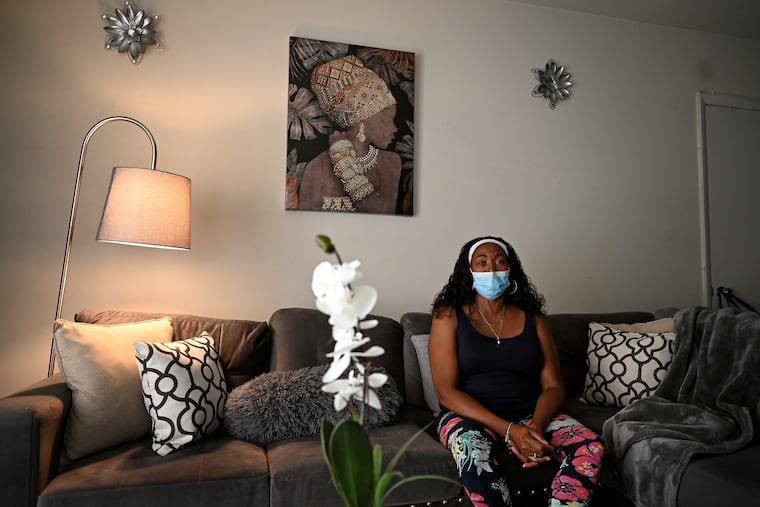Pa.’s ChildLine abuse registry violates the state constitution, a new lawsuit alleges
Any fixes to the ChildLine registry need to strike a difficult balance between helping wrongfully accused adults and protecting children from harm.

Three times in the last two years, Northeast Philadelphia resident Angela West lost out on better-paying jobs for the same frustrating reason.
in 2004, West was working in a group home for children with cerebral palsy when one of the residents had unexplained bruises that a doctor said were the result of physical abuse. Under a quirk in the law that has since been changed, all seven staffers who worked that week — including West — were added to Pennsylvania’s registry of child abusers with no chance to defend themselves until after they were listed.
For years, West, 57, has felt stuck, unable to move to a job that would pay more than her current $15 hourly wage as a direct support professional for two women with mental illness. The widespread use of the ChildLine abuse registry as a screening tool for many human services jobs means some prospective employers offering higher wages can’t hire her, including a behavioral health facility that offers $20 an hour.
“I can’t even go there and get that when I know I’m qualified because of this background. It’s been on my record for 18 years,” West said.
In a bid for relief, West signed on to a Commonwealth Court lawsuit last month alleging that the state’s ChildLine registry is unconstitutional because listing people on it, potentially for life, before a formal hearing can happen “violates the due process rights and reputational protections guaranteed” by the state’s constitution.
Five other individual plaintiffs are parents on the registry for incidents involving their own children.
The lawsuit, filed on a pro bono basis by Philadelphia law firm LeVan Stapleton Segal Cochran LLC, along with the nonprofit Community Legal Services of Philadelphia and University of Pennsylvania law professor Seth Kreimer, asks the court to order state officials to give people a hearing before a neutral party before they are put on the registry. Twelve other states already do that, a CLS lawyer said.
A major theme in the petition is that the registry “has a disproportionate and insidious effect on poor women, families of color, and the communities in which they live” because it prevents them from obtaining many jobs in heath care and human services, a huge swath of the economy.
As such, the litigation is an attempt to improve the balance between protecting children from abuse and protecting them from the deleterious impact that can occur when their parents are not able to get better jobs. Being placed on the ChildLine list can also prevent parents from volunteering at school or community events with their children.
A spokesperson for the Pennsylvania Department of Human Services, which administers ChildLine and is the named defendant, said the agency was unable to comment on pending litigation.
Different focus for child advocates
Advocates for children acknowledged that the petition paints an alarming picture and agreed that the administration of the ChildLine registry should be improved, but said that they would like to keep the focus on children.
“There’s alarm from some of us that the pendulum is swinging a little too far or is a little too adult-driven and losing sight of the fact that for a lot of people who are put on the registry they have, in fact, done something harmful to a child,” said Cathleen Palm, founder of the Center for Children’s Justice, a nonprofit in Bernville, Pa., that works to protect children from child abuse, including sexual abuse.
Last year, state officials received 38,013 reports of suspected child abuse and substantiated 5,438 of them. Sexual abuse accounted for the largest share, 40% of all cases. Abuse incidents included 58 fatalities and 136 near fatalities, according the state’s Child Protective Services annual report.
“While the protection and safety of children is an indisputably important public interest that the commonwealth can and should zealously pursue, the commonwealth’s efforts must comport with the guaranteed rights provided by the constitution,” the petition says.
The lawsuit presents statistics showing that at the second level of appeal, the Bureau of Hearings and Appeals, at least 90% of substantiated reports have been overturned during the last three years. Last year, the bureau heard 70 cases and overturned 64 of them.
The petition presents that as evidence that initial decisions, usually made by a county social worker, “are often seriously flawed and lack evidentiary value.”
But Frank Cervone, executive director of the Support Center for Child Advocates in Philadelphia, which provides training and other aid to lawyers who volunteer to represent children in abuse and neglect cases, said the petition attributes too much significance to the high rate of cases overturned.
“They’re not because the person was wrongly accused. The case deteriorated on its own by the passage of time,” he said.
Common ground
Common ground exists between child advocates, such as Cervone and Palm, and those who are pushing for changes to the ChildLine registry to make it less harmful to parents who undeservedly end up on the registry, which has a low standard of evidence for getting listed.
A tiered system would help, both sides said.
“In Pennsylvania, it doesn’t matter if you’re accused of missing doctor’s appointments for your kids or sexually abusing a child, you’re treated the exact same way in terms of being placed on the registry for life,” said Jamie Gullen, managing attorney of the employment unit and Youth Justice Project at Community Legal Services.
“A lot of other states don’t do it that way,” she said. “They have different tiers, so some types of neglect cases wouldn’t get reported to employers at all because why is that relevant to an employer.”